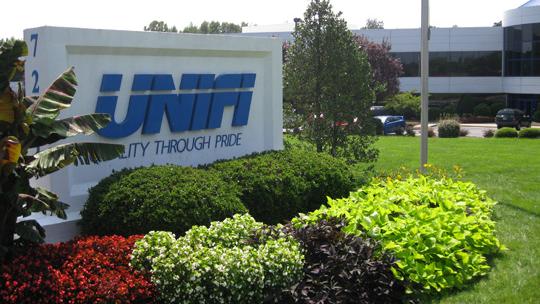Unifi Inc., the producer of recycled and synthetic yarns, reported profits dropped in the first quarter ended September 30 as a result of higher raw material costs and warned the second-quarter earnings would be impacted by a “surge” in polyester raw material costs in September. Sales in the first quarter rose 10.6 percent.
First Quarter Fiscal 2019 Highlights
- Net sales increased $17.4 million, or 10.6 percent, to $181.6 million compared to $164.2 million for the first quarter of fiscal 2018 and increased $24.0 million, or 14.6 percent, when excluding the impact of foreign currency translation.
- Revenues from premium value-added (“PVA”) products grew 10.1 percent compared to the first quarter of fiscal 2018, or 14.4 percent when excluding the impact of foreign currency translation and represented approximately 43 percent of consolidated net sales.
- Gross margin was 11.0 percent compared to 14.2 percent for the first quarter of fiscal 2018, impacted by higher costs, including raw materials and a less favorable sales mix.
- Operating income was $5.7 million compared to $10.2 million for the first quarter of fiscal 2018, impacted by lower gross profit and incremental selling, general and administrative (SG&A) expenses.
- Diluted EPS was $0.10 compared to $0.48 for the first quarter of fiscal 2018 impacted by a loss from Parkdale America, LLC (PAL) and a significantly higher effective tax rate.
- High-end of the range of expectations for fiscal 2019 profitability has been reduced to reflect cost pressures, and fiscal 2019 effective tax rate outlook is updated accordingly.
“We continued to execute on our strategy of driving sales with our PVA portfolio as our team delivered its sixth consecutive quarter of sales growth,” said Kevin Hall, chairman and CEO of Unifi. “Our PVA portfolio, including the sustainable REPREVE platform, continues to distinguish us in the global market. While we are proud of our overall sales growth, profitability fell below expectations as raw material costs rose again. Similarly, profitability for the Parkdale joint venture fell below expectations due to higher cotton costs. We saw sales benefit from our recently acquired dyed business and remain upbeat on the outlook for this venture, even though we are incurring some short-term integration costs. Unifi has and will continue to take pricing actions to counterbalance rising input costs while focusing on improving margins by delivering innovative and sustainable solutions necessary to achieve profitable long-term growth.”
First Quarter Fiscal 2019 Operational Review
The first quarter of fiscal 2019 consisted of 14 weeks compared to 13 weeks in the first quarter of fiscal 2018. Net sales in the first quarter of fiscal 2019 increased $17.4 million, or 10.6 percent, to $181.6 million, compared to $164.2 million for the first quarter of fiscal 2018, and increased $24.0 million, or 14.6 percent, when excluding the impact of foreign currency translation. Domestic revenue growth was driven by the additional fiscal week in the quarter contributing approximately $8.3 million and an increase in sales volume and pricing actions implemented during the second half of fiscal 2018. International revenue growth was led by PVA product sales, partially offset by unfavorable foreign currency translation impacts.
Gross margin was 11.0 percent for the first quarter of fiscal 2019 compared to 14.2 percent for the first quarter of fiscal 2018. The decrease in gross margin was driven primarily by higher raw material costs, a less favorable sales mix in a highly competitive domestic environment and integration costs associated with the recent dyed business acquisition. Raw material-related pricing adjustments continued to take hold in the first quarter of fiscal 2019, but these adjustments were not sufficient to overcome the additional raw material cost increases experienced in the quarter.
Operating income declined to $5.7 million for the first quarter of fiscal 2019 from $10.2 million for the first quarter of fiscal 2018. The decline in operating income was primarily due to the $3.3 million decrease in gross profit and a $1.5 million increase in SG&A expenses. Gross profit included a $0.9 million decline for its Brazil operations related to the weaker economic environment amid local political volatility. SG&A expenses were in line with recent levels which include the incremental investments in the company’s commercial capabilities made in fiscal 2018. Foreign currency transaction gains in the first quarter of fiscal 2019 totaled $0.3 million, compared to losses of $0.3 million in the first quarter of fiscal 2018.
Net income was $1.8 million for the first quarter of fiscal 2019 compared to $9.0 million for the first quarter of fiscal 2018. Net income for the first quarter of fiscal 2019 was adversely impacted by comparatively higher operating expenses, $2.9 million less in pre-tax earnings from PAL and a higher effective tax rate. Diluted EPS was $0.10 for the first quarter of fiscal 2019 and $0.48 for the first quarter of fiscal 2018.
Adjusted EBITDA was $11.9 million for the first quarter of fiscal 2019 compared to $15.8 million for the first quarter of fiscal 2018. The decrease in Adjusted EBITDA resulted primarily from lower gross profit and incremental SG&A expenses. Adjusted EBITDA is a non-GAAP financial measure.
Net debt (debt principal less cash and cash equivalents) was $98.8 million at September 30, 2018 compared to $86.3 million at June 24, 2018 as working capital increased in the quarter. Cash and cash equivalents decreased from $44.9 million at June 24, 2018 to $42.2 million at September 30, 2018.
Fiscal 2019 Outlook
Fiscal 2019 contains 53 fiscal weeks, with the additional week included in the first fiscal quarter. The company’s second quarter gross profit will be unfavorably impacted by a surge in polyester raw material costs in September, which was driven by higher global demand and tighter supply for polyester feedstocks and a seasonal shut-down period in December 2018 which will occur in the company’s second quarter rather than the third quarter as it did in the prior year. Therefore, the company’s expectations for net sales and capital expenditures remain unchanged, while the high end of the range of expectations for operating income and Adjusted EBITDA growth has been reduced. Consistent with these expectations, and having greater clarity on the effects of recent tax reform legislation, the company has increased its effective tax rate outlook. However, the company expects cash tax payments as a percentage of income before income taxes to be in the mid-30 percent range. In summary, the company now anticipates the following:
- Mid-single-digit percentage growth for net sales;
- Mid-single-digit percentage growth for operating income and Adjusted EBITDA, assuming an improving price to raw material cost relationship;
- Capital expenditures of approximately $25.0 million and
- An effective tax rate in the mid-40 percent range, subject to further adjustment in light of pending interpretations of the December 2017 federal tax reform legislation.
Previously, Unifi had expected:
- Mid-single-digit percentage growth for net sales;
- Mid- to high-single-digit percentage growth for operating income and Adjusted EBITDA;
- Capital expenditures of approximately $25.0 million and
- An effective tax rate in the low 30 percent range, subject to adjustment in light of pending interpretations of the December 2017 federal tax reform legislation.
“Raw material costs have been rising over the last four quarters, and there was a dramatic jump in polyester costs in September that will place even more pressure on our second quarter profitability. While this rise is clearly a headwind, we anticipate a better relationship between pricing and cost in the second half of the year. This would benefit our third and fourth quarters, returning our profitability to the lower end of our original expectations,” said Kevin Hall, chairman and CEO of Unifi. “We will continue to address input cost pressures with responsive pricing actions while focusing on increased sales of innovative solutions that we believe will provide us the portfolio differentiation necessary to achieve long-term growth. We look forward to providing more detail on our strategic growth plan for the next few years during our Investor Day on November 15.”
















